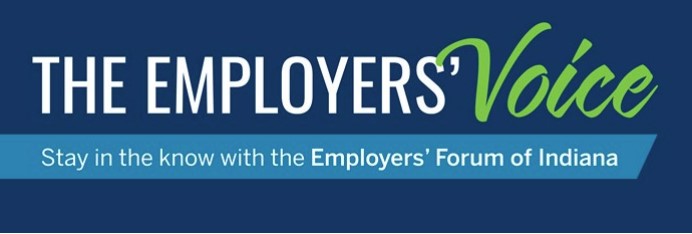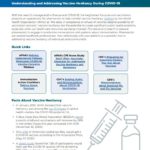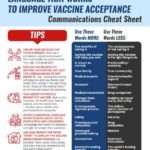
Welcome from the Forum!
Welcome to this quarter’s issue of The Employers’ Voice, an e-newsletter for Employers’ Forum of Indiana members and others interested in healthcare.
In this issue we’ll share a snapshot of what the Forum has been up to, along with some articles of interest relating to COVID-19, Healthcare Policy and other current events. We invite you to send resources and news of interest as the purpose of this newsletter is to provide a venue for sharing information among our diverse healthcare community. Wishing you and your family good health this year.
Gloria Sachdev
President and CEO, Employers’ Forum of Indiana
Employers’ Forum All-Stakeholder Meetings
Next All-Stakeholder Meeting

Addressing High Prescription Medication Cost Part 1 February 25, 2021
11:30 am – 2:30 pm
View Agenda
The registration link for this meeting was sent to members on 1/25/2021. For questions, please contact meetings@employersforumindiana.org
Upcoming Meetings
May 6, 2021
September 17, 2021
November 4, 2021
Visit our Meetings Page for an archive of past meeting materials and presentations.
COVID-19 Vaccines in Indiana
The vaccination of Hoosiers against COVID-19 is currently ongoing. Among those now eligible are any Hoosier age 65 and older. Click here for a full list of eligible individuals.
Those eligible to be vaccinated can visit vaccine.coronavirus.in.gov to schedule an appointment. The timeline for additional phases of vaccine administration is yet to be determined.
Visit the State of Indiana’s Coronavirus information site for updates.
Learn about Vaccine Hesitancy:

Understanding and Addressing Vaccine Hesitancy During COVID-19
American Pharmacists Association
Policy Highlights
COVID Liability Protection Legislation Signed into Law
(Senate Bill 1 – Civil Immunity Related to COVID-19)
On February 18, 2021, Governor Holcomb signed Senate Bill 1 – Civil Immunity Related to COVID-19 into law. This law protects businesses from coronavirus-related civil lawsuits, except in a case of gross negligence or willful or wanton misconduct. The bill goes into effect immediately and is retroactive to March 1, 2020, and is set to expire December 31, 2024.
Supporting Health Care Competition in the Era of COVID-19: Three Legislative Models for States
(Health Affairs Blog)
In this blog post, Health Affairs highlight three types of state legislation that could help maintain or encourage competition in the face of provider closures and acquisitions:
- Bans on anti-competitive clauses in provider contracts
- Certificate of public advantage laws
- Modifications to scope-of-practice laws
In Indiana, we aim to pursue what is outlined in this excellent post!
Coverage Provisions in the 2021 Appropriations and COVID-19 Stimulus Package
(Health Affairs Blog)
On December 27, 2020, former President Trump signed a sweeping legislative package into law that appropriated more than $1.4 trillion for fiscal year 2021 and included $900 billion for pandemic relief. Highlights of the healthcare provisions include:
Surprise Billing Protections: The No Surprises Act holds patients harmless for surprise medical bills sent from out-of-network providers for emergency services and non-emergency services at in-network facilities. Excludes ground ambulance and establishes an arbitration process for payment.
Price & Quality Transparency for Consumers: Consumers who are scheduled to receive a healthcare service will be entitled to receive an “advanced EOB” including network details and a price/cost sharing estimate.
Removal of Gag Clauses: Prohibits gag clauses in provider-insurer contracts.
Insurer Disclosure: Insurers must disclose financial incentives paid to Brokers and Benefit Consultants. Brokers and Consultants must also disclose financial relationships with vendors to employers.
All-Payer Claims Database (APCDs): States can request $2.5 million to revamp, expand, or develop their APCD.
Drug Price Transparency: Plans must submit data on pharmacy benefits and drug costs to federal regulators on an annual basis. This information will be compiled in a publicly available biannual report.
Member Spotlight
Sara Morris, CEBS, PHR

Job Title: Assistant Vice President, Employee Benefits and Experience
Organization: Ivy Tech Community College – Systems Office
Tell us how you got to the position you are in today.
I have been working in the HR and Employee Benefits field for over 13 years. I got my start in HR at a locally owned restaurant organization, MCL Restaurant and Bakery. I joined Goodwill of Central and Southern Indiana in 2013 and had the privilege of serving as their Manager of Benefits and Wellness for over 13 years. Goodwill is an amazing mission-driven organization and I am so thankful for the time I spent there. I recently was given the opportunity to join the Ivy Tech leadership team and serve as the AVP of Employee Benefits and Experience. It is nice to work for another organization with such a strong focus on student and employee success. I couldn’t be more excited for the future!
If you could add or take away something in the Healthcare system, what would it be?
I am interested in how our health care delivery system can continue to evolve from one that is primarily utilized when we are already sick, to one that is utilized to help prevent us from getting sick. Access to quality and affordable preventive care is extremely important. An increased focus on mental health and availability to these providers is important to me as well.
If you could travel anywhere in the world, where would you go?
I’m hopeful to travel to central Europe at some point in the near future. One of my all-time favorite movies is The Sound of Music. I would love to participate in the original tour conducted in Salzburg, Austria. I wouldn’t mind touring Switzerland while I’m out there as well!
In the News
Employers
Montana’s Health Policy MVP Takes Her Playbook on the Road (KHN)
Marilyn Bartlett, credited with saving Montana’s state employee health plan millions of dollars, is a busy consultant now, as states, counties and big businesses try to use her playbook to bring down hospital costs.
Predictions on insurance premium all over the map (IBJ – Subscription Required)
Since 2010, average family premiums for employer-sponsored health insurance have soared 55%, at least twice as fast as wages (27%) and inflation (19%), according to the Kaiser Family Foundation.
International comparisons of health care prices from the 2017 iFHP survey (Health Care Cost Institute)
Overview of the latest International Comparison of Health Prices Report. The report compares the median prices paid by a sample of private health insurance companies for specific health care services in nine countries. The median prices paid by private insurance for health care services in the United States was almost always higher than the median prices in the eight other countries included in the iFHP study.
Health Care Industry
Government-Funded Scientists Laid the Groundwork for Billion-Dollar Vaccines (KHN)
Basic research conducted by Dr. Barney Graham and others at the National Institutes of Health, Defense Department and federally funded academic laboratories has been the essential ingredient in the rapid development of vaccines in response to COVID-19. The government has poured an additional $10.5 billion into vaccine companies since the pandemic began to accelerate the delivery of their products.
Trump Signs Law Revoking Health Insurers’ Antitrust Immunity (Lexology)
On December 22, 2020, Congress passed the Competitive Health Insurance Reform Act (CHIRA), H.R. 1418, which will amend the McCarran-Ferguson Act to apply the federal antitrust laws to the health insurance industry. President Trump signed the bill into law on January 13, 2021.
Walmart, Amazon & more: 5 retail giants’ virtual care strategies (Becker’s Hospital Review)
From making telemedicine more consumer friendly to increasing access to care during the pandemic, retail giants including Amazon, Walmart and Walgreens are ramping up their virtual care initiatives and innovating the healthcare delivery system. Here are 11 things to know about Walmart, Amazon, Sam’s Club, CVS and Walgreens’ telehealth expansions over the past year.
Hospitals
WHAT DID YOU PAY?: Study finds Indiana has some of the highest health care costs (The Herald Bulletin)
What hospitals are going to charge you for a visit or surgical procedure is often anyone’s guess, but Hoosiers in particular pay some of the highest health care prices in the country.
Hospital Prices Just Got a Lot More Transparent. What Does This Mean for You? (KHN)
Hospitals face the new year with new requirements to post price information they have long sought to obscure: the actual prices negotiated with insurers and the discounts they offer their cash-paying customers.
How Rich Hospitals Profit From Patients in Car Crashes (New York Times)
Hospitals use century-old lien laws to bypass insurers and charge patients, especially poorer ones, the full amount.
Hospitals get ‘raw deal’ as CMS rejects site-neutral pay cut exemptions (Modern Healthcare – Subscription Required)
CMS has rejected more than 60% of mid-build exceptions which had previously allowed hospitals to be reimbursed at the full Outpatient Prospective Payments System rate if they had documentation to prove their off-campus outpatient departments were being constructed when the Bipartisan Budget Act was passed in 2015. This means that facility reimbursement rate would drop by 60% and those facilities would be liable for overpayments billed and issued via OPPS starting from January 1st, 2018.
Pharmacy
Pharmaceutical Industry Profits And Research And Development (Health Affairs)
When the challenge of affording prescription drugs is raised, pharmaceutical manufacturers often argue that steps to reduce prices will lead to less innovation in the future. The manufacturers’ argument has validity in that expectations of lower revenues will lead to less investment in research and development (R&D). But we question the premise that more innovation is always a good thing.
Physician and Patient Adjustment to Reference Pricing for Drugs (JAMA Network)
Is reference pricing in employment-based health insurance associated with prescribing lower-priced drugs, and is this prescribing practice associated with reductions in cost sharing by patients? In this economic evaluation of 3.3 million drug insurance claims, after implementation of reference pricing, physicians increased the prescription of the low-cost drugs within each therapeutic class, and this increase was associated with a reduction of prices paid by employers and cost sharing paid by employees.
A Status Report on Prescription Drug Policies and Proposals at the Start of the Biden Administration (KFF)
As President Biden takes the reins in Washington DC, his administration inherits a handful of final rules advanced by the Trump Administration in its final months related to Medicare, importation, and 340B pricing for insulin and epinephrine. This brief provides a status update on these final rules and an overview of key Medicare-related drug pricing proposals supported by President Biden during the campaign that may return to the forefront of health policy discussions in the coming years.
Using External Reference Pricing In Medicare Part D To Reduce Drug Price Differentials With Other Countries (Health Affairs – Subscription Required)
Comparison of price differentials between the US and the UK, Japan, and Ontario (Canada) for single-source brand name drugs that had been on the market for at least 3 years. The estimated savings to Medicare Part D of adopting the average price of drugs in the reference countries was $72.9 billion in 2018.
Featured: Tradeoffs Podcast
Tradeoffs: The High Price of Lowering Health Costs for 150 Million Americans
Employers’ Forum of Indiana and Tradeoff’s work to bring fairer, more transparent prices to employer-based health care will be featured on the national health policy podcast Tradeoffs this week as part of an episode called “The High Price of Lowering Health Costs for 150 Million Americans”!
Voices in the episode include Gloria Sachdev, Candace Shaffer, Marilyn Bartlett and Bob Smith, along with Harvard economist Mike Chernew, Purchaser Business Group on Health’s Elizabeth Mitchell, and a leader and member of 32BJ, a union doing innovative health cost work in New York.
The episode is available now and can be streamed on the show’s website, in Apple Podcasts or in Spotify.
Listen to the show now:
On-Demand & Live Webinars
On-Demand
Rights & Responsibilities of Plan Sponsors as Fiduciaries
National Alliance of Healthcare Purchaser Coalitions
This webinar addresses the rights & responsibilities of plan sponsors as fiduciaries when it comes to accessing your health plan’s health data, price transparency, and exercising discretion to manage healthcare spend on behalf of plan beneficiaries.
How Payers, the Life Science Industry, and Others Can Move from Insight to Action
Icer Analytics
The Institute for Clinical and Economic Review (ICER) launched ICER Analytics on November 30, 2020. ICER Analytics is a new cloud-based platform that will assist in the development of formularies, negotiate drug prices, and explore new ways to apply evidence, with the aim to achieve fair prices and fair access for all. This webinar will give you an inside look at the ICER Analytics platform, as well as a step by step tutorial on how to utilize the space.
Upcoming Live Webinars

Visit the National Alliance of Healthcare Purchaser Coalitions website for a list of all of their upcoming events.
Cannabis: Adhering to Evidence and Value-Based Standards
February 23, 1:00 – 2:00 pm EST
Read the Action Brief HERE
Register
Mental Health Index
February 19, 12:00 – 12:30 pm EST
Register
Fiduciary Check In
March 18, 1:00 – 1:30 pm EST
Register
Mental Health Index
March 19, 12:00 – 12:30 pm EST
Register
Do you have a suggestion or contribution for our next newsletter? Contact us.






